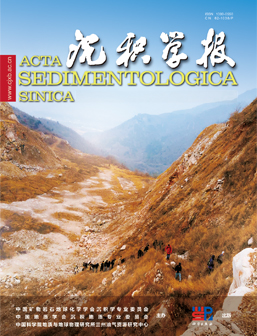High-frequency Sequence Division and reservoir-controlling effect of Ma5 1-5 Sub-member in Tao 7 Block, Ordos Basin
doi: 10.14027/j.issn.1000-0550.2024.023
- Received Date: 2023-10-20
- Available Online: 2024-04-07
-
Key words:
- Key words: high frequency sequence /
- carbonate rock /
- Ma51-5 sub-member /
- Ordos Basin
Abstract: Abstract: [Objective] In order to discuss the high-frequency sequence division and effect of high-frequency sedimentary cycle control reservoir in carbonate strata. [Methods] Used the Th/U ratio curve in natural gamma ray spectrum logging as the indicator curve, combined with Fisher diagram and lithological assemblage sequence, high frequency sequence of Ma51-5 sub-member of Majiagou Formation were divided quantitatively in Tao 7 block of Ordos basin. [Results] The research shows that the Th/U ratio in natural gamma-ray spectroscopy logging can be used as an indirect alternative index of astronomical orbit in carbonate strata. The high-frequency sequence can be effectively divided by quantitative and qualitative analysis methods such as spectrum analysis combined with Fisher diagram and lithologic lithofacies analysis. Ma51-5 sub-member in Block 7 can be divided into one third-order sequence, six fourth-order sequences and twenty fifth-order sequences. It is estimated that the average deposition rate of Ma51-5 sub-member is 5.03 cm/kyr and the deposition time is about 2.43 Ma. The gypsum pseudocrystal dolomite , which developed in the upper part of the intertidal zone and in the top of the high-frequency sedimentary cycle with upward shallowing, is the dominant facies belt for reservoir development. Near the high-frequency sequence boundary of the fourth-order sequence is the favorable interval for reservoir development. The frequent changes of sea level cause early karstification, which is the main driving force for the formation of karst model pores in the Ma51-4 sub-member and the basis of later supergene gas karstification. [Conclusion] Quantitative identification and division of high-frequency sequence is impotant for reservoir prediction in carbonate strata.
| Citation: | High-frequency Sequence Division and reservoir-controlling effect of Ma5 1-5 Sub-member in Tao 7 Block, Ordos Basin[J]. Acta Sedimentologica Sinica. doi: 10.14027/j.issn.1000-0550.2024.023 |






 DownLoad:
DownLoad: